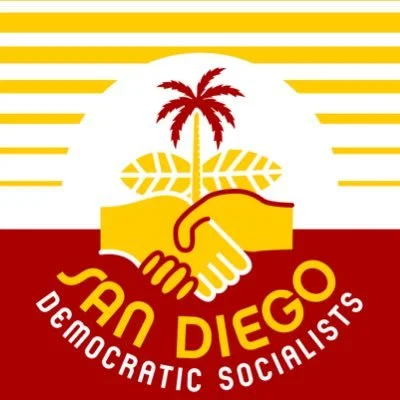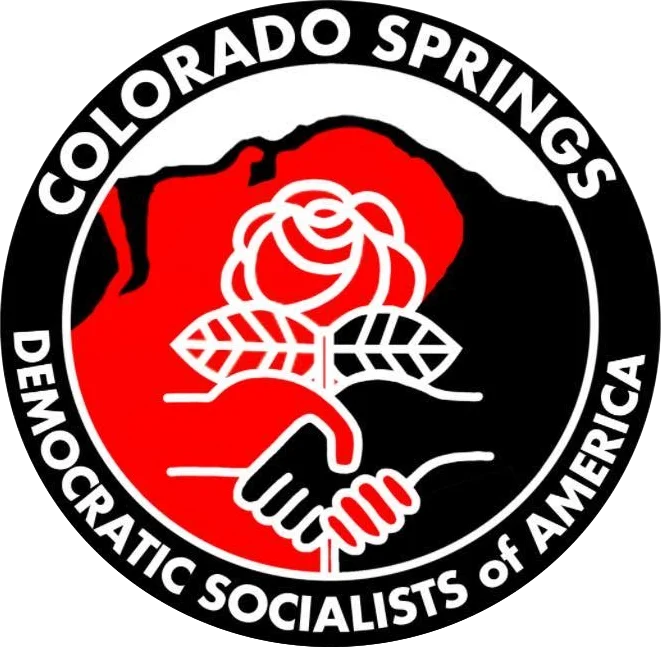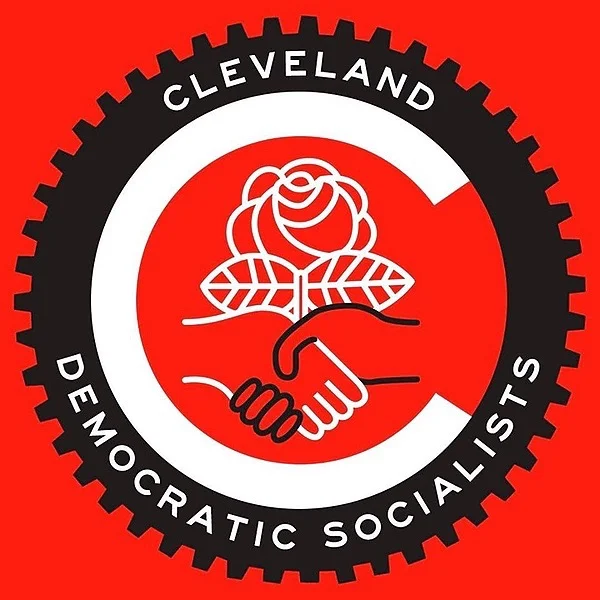

Yes on Prop 50 – Activities
Can’t make one of our DSA San Diego canvasses? There are plenty of other ways to get involved in this fight: Donate to California DSA’s PAC! (Donate here) This helps us print DSA-branded literature and purchase canvassing tools for our outreach efforts. We rely entirely on contributions from members and supporters. Every little bit helps! [...]
Read More... from Yes on Prop 50 – Activities
The post Yes on Prop 50 – Activities appeared first on Democratic Socialists of America | San Diego Chapter.


Colorado Springs DSA stands in solidarity with D11 School board candidate Charles Johnson against racist attacks
The Colorado Springs DSA strongly believes in the power of public education to empower and to liberate. We believe that the best people to decide how and what to teach are professional educators. We have been deeply troubled at the consistent interference from the extremist school board in District 11 of Colorado Springs as they deprive teachers of the very agency that allows them to excel. Their decisions are becoming ever more concerning. No novels in high school English classes. Pages physically cut out of health textbooks. And just last week we understand they cut from the curriculum the incredible abolitionist, writer, and orator Frederick Douglass.
Instead of cutting Douglass from the curriculum, we choose to live by his words, “I would unite with anybody to do right and with nobody to do wrong.” We choose to unite with Charles Johnson, a union-endorsed candidate for the school board in D11. We know that he is trying to do right, even as the allies of the extremists now vying for seats on the board play into the shameful, racist tradition of painting Black men as criminals by sending out a mass text showing the mugshot from Charles’s 2020 arrest. True to what we know of him, he was guilty only of, as John Lewis loved to say, making good trouble.
In 2019, a good friend of Charles, De’Von Bailey, was shot in the back and killed by the Colorado Springs Police Department. Charles organized for greater accountability for the department. At COS DSA, we know that Black history is fundamental to American history. Maybe if these extremists spent more time studying it instead of erasing it, they would know how predictable it was that Charles was then singled out for arrest by CSPD. But they don’t know, and we suspect they just don’t care.
We stand in solidarity with Charles Johnson. Charles has been a friend to many of us who are organizers and activists in Colorado Springs, and we know him to be kind and insightful. A product of D11 himself, his commitment to teachers and students in the district is an inspiration. As the Colorado Springs Education Association prepares to strike on October 8th, we call on everyone able to show teachers their support by joining them on the picket line and by standing with Charles and the rest of the union-endorsed school board candidates come the November election. Their only goal is one we all surely share; outstanding public education in this city we love.


Colorado Springs DSA stands in solidarity with the Sumud Flotilla
On 10/1/2025 the Global Sumud Flotilla was intercepted by the IDF while trying to deliver life saving aid to the Palestinians living under a blockade in Gaza. A coalition of organizers, humanitarians, doctors, artists, clergy, lawyers, and seafarers across 57 countries were just off the coast of Gaza, intending to break Israel’s blockade with much needed humanitarian aid, when they were violently intercepted by the IDF.
We condemn this act of violence against a group of peaceful humanitarians working to end the man-made famine imposed upon the Palestinians in Gaza. While Israel continues to actively and mercilessly bomb the Gaza strip to complete its goal of genocide and ethnic cleansing, the Global Sumud Flotilla was a beacon of hope to those waiting for much needed relief. The Global Sumud Flotilla poses no threat. They are unarmed and only carrying supplies needed by the population of Gaza such as baby formula, medical supplies, and food.
To meet a peaceful convoy of humanitarian aid with such violence and little regard for human life is appalling. The response from Italy to try and force the Global Sumud Flotilla to turn away, siding with the IDF and betraying their own citizens, is shameful. The United States is turning a blind eye to the U.S. citizens that have been kidnapped from the convoy while it continues to be involved with and enable the illegal and immoral actions of the illegal occupation known as Israel.
We are living in a moment which, when looked back on, everyone will say they have always been against these violent acts. We must keep hope, because to keep hope is to believe truly and honestly that Palestine will be free.
Israel must release all the hostages they have kidnapped from the Global Sumud Flotilla, they must ensure their safety, and they must allow aid into Gaza. As activist and arguably one of the most famous members of the Global Sumud Flotilla, Greta Thunberg, has said, “I'm not scared of Israel. I'm scared of a world that has seemingly lost all sense of humanity.” We must not lose our humanity and continue to uplift the Palestinian cause as it is just, it is moral, and it is freedom, not just for the Palestinians, but for all of us. Because none of us are free until all of us are free. We stand with the Global Sumud Flotilla, we condemn the violence and kidnapping, and we stand with the Palestinians in their hope to someday soon be truly free.



RVDSA Endorses Jill Brevik for Amherst Town Council
SVDSA Supports Measure A to Protect our County Hospital System
On independence day during the first year of his second term, President Donald J. Trump signed budget reconciliation bill H.R.1 into law. Dubbed by conservative lawmakers as the ‘One Big Beautiful Bill’, H.R.1 was the catalyst for a tumultuous legislative cycle defined by rewrites, carveouts, and dishonesty. While the president claimed this bill would address inflation and the deficit and put money back in the pockets of Americans, realistically this bill functions as the continuation of the immense wealth transfer towards the ruling class that has been poorly masked in this country for decades.
H.R.1 is abundant with cuts to multiple institutions that sought to uplift those in need. Perhaps the most dangerous of these gut the public health systems across the country, resulting in billions of dollars stripped from hospitals, clinics, and other healthcare services that millions of people rely on every day. Silicon Valley DSA believes healthcare is a fundamental human right. The Trump Administration and conservative lawmakers, who kowtow and walk in lockstep with everything the president demands, seek to deny this right to those who need adequate social safety nets to uplift and propel the community.
Some of the more alarming cuts for the community Silicon Valley DSA calls home are those that impact Medi-Cal. Santa Clara County relies on approximately $3.5 billion in federal funding annually, and the cuts within H.R.1 are anticipated to cause losses of nearly 30% of that funding, which goes towards essential healthcare services within the community, including but not limited to emergency rooms, trauma response units, mental health programs, cancer treatment centers, community clinics, and the only burn unit in the Bay Area, one of only three such facilities between Los Angeles and the Oregon border. Additionally, a quarter of all residents and half of all county hospital patients rely on Medi-Cal for adequate, affordable treatment.
The damage will not stop at those who rely on Medi-Cal, though. Budget cuts such as those seen in H.R.1 cause ripple effects. A loss of federal funding at this scale can devastate the infrastructure of the community’s public health system as a whole, being the impetus for longer wait times, shrinking staff and capacity, and even the closing of facilities entirely. As Santa Clara County already has the second lowest capacity emergency department (ED) beds per capita, losing this funding puts at risk the health and safety of all county residents, regardless of provider.
To combat what can only be described as a direct attack on the health and welfare of the American people, Silicon Valley DSA has unanimously decided to endorse Measure A, a ballot measure authored by the Santa Clara County Board of Supervisors to be voted on during the November 4, 2025 special election.
Measure A is a temporary 5/8 cent sales tax increase across Santa Clara County that could raise upwards of $330 million annually to support the public health systems that are under siege by the current administration. This tax, which equates to approximately 62 cents per every $100 spent, will save lives. The generated tax revenue, while not completely offsetting the cuts, will keep hospitals open, keep medical professionals and facility staff employed, and protect access to care for hundreds of thousands of Santa Clara County residents. Measure A would expire in April 2031, and independent audits and strict oversight will seek to ensure this generated sales tax revenue will be allocated appropriately. We feel it’s also important to note that, per Regulation 1602 Sections 6091, 6353, and 6359 of the California Revenue and Taxation Code, groceries, prescriptions, and other necessities are exempt from sales tax, meaning these daily bills will not be impacted were Measure A to pass this November.
We recognize that a sales tax is a regressive funding mechanism and isn’t the ideal answer to the circumstances we now face, but the urgency and severity of this crisis brought on by our lawmakers requires swift action. While imperfect, Silicon Valley DSA implores the community to vote ‘YES’ on Measure A during the November special election, and we intend to mobilize members, along with our allies in labor unions, community organizations, immigrants rights groups, public health advocates, and beyond to ensure its passage. Our initial campaigning efforts to help Measure A gain the momentum it needs have included phone banking and canvassing in collaboration with the South Bay Labor Council throughout September, and we will continue these efforts weekly until the election. We invite you to come join us. Find details on our calendar at https://siliconvalleydsa.org/events/.
In the meantime, recognition that this is not a permanent solution means continuing to push forward in our work garnering support for the ultimate goal of a fully funded, publicly owned, and democratically run healthcare system that ensures quality, timely care for all in need, as it has been proven time and time again private equity without fail negatively impacts healthcare.
Our fight is against both Democrats and Republicans who continue to diminish the rights and voice of the constituents they promised to serve to instead benefit themselves and their billionaire corporate donors. DSA believes a better world is possible, one where we democratically decide on how society is structured for the common good rather than the profit of a few. Join us at https://siliconvalleydsa.org/join/.
The post SVDSA Supports Measure A to Protect our County Hospital System appeared first on Silicon Valley DSA.


Endorsement: Zoelle Lane, Fort Collins Council
Zoelle Lane is running for Fort Collins Council. Zoelle is an immigrant, union member, and renter running to tackle Fort Collins’ cost of living crisis and to empower its residents. One of her goals for office is to raise the minimum wage, which is long overdue!
Zoelle is part of a slate of candidates in the Socialist Cash Takes Out Capitalist Trash fundraising project!


DSA is an Anti-Zionist Organization!
Author: Megan R
One of the most contentious and confusing debate blocks at the 2025 Convention was the international section, specifically deliberation on the resolution titled For a Fighting Anti-Zionist DSA (R22) and the agendized amendment titled Align With the BDS Movement (R22-A01).
For context to anyone who is not plugged into DSA’s founding story:
“Whereas, and antithetical to the DSA’s contemporary principles and policies, DSA’s founding merger was heavily predicated on ensuring that the DSA would uphold DSOC’s position of supporting continued American aid for Israel’s Zionist colonial project, as explicitly noted in our organization’s founding merger documents (e.g., Points of Political Unity) and by Michael Harrington himself in his autobiography;”
– Anti-Zionist Resolution (#12), which was referred to the National Political Committee (NPC) from the 2023 National Convention
Members of DSA have been organizing within our democratic structures to course correct since the very beginning and that effort has been documented since at least 2019 (see passed resolution #35, speaker lineup). Organizers who are passionate about Palestinian liberation have devoted themselves to the steady and demanding work of changing minds of our comrades in DSA. We have come a long way as an organization in solidarity with our Palestinian comrades, despite what external reporters would like to imply. This progress is laid out neatly in the “whereas” clauses of R22 which details not only the statements made over the last few years, but also the working groups created, campaigns run, and strategies defined.
Much of what we passed during this convention will support our Palestine work, such as the formal commitment to the “independent party surrogate” electoral strategy. It would have been great to also pass the Electoral Discipline resolution, which would reduce the damage that could be caused by chapter electoral program fiefdoms by providing a framework for chapters, but that will resurface in 2027!
The R22 Anti-Zionist resolution in particular was the culmination of more than two years of dedicated effort to confirm our commitment to being an explicitly anti-Zionist organization.
“Make DSA an Anti-Zionist Organization in Principle and Praxis” was originally brought forward for consideration at the 2023 National Convention but was referred to the NPC for a decision. In the last two years, many chapters have voted to adopt variations of this resolution locally, including our own chapter! (See the text differences in both resolutions here.)
“[Since] March 25th 2025, 54 DSA chapters representing over 30,000 DSA members have passed their own versions of the “Make DSA an Anti-Zionist Organization in Principle and Praxis” resolution, enshrining locally both membership expectations and electoral endorsement conditions of principled anti-Zionism that has provided a necessary, material counter-weight to the Zionist lobby for progressives running for local office.”
– For a Fighting Anti-Zionist DSA, which passed at the 2025 National Convention
Fun Fact: Our 2023 chapter delegation had a fuzzier political divide on this topic (4-2-2 split for delegates, 8-3-2 for candidates) than our 2025 chapter delegation did (7-1-4 split for delegates, 10-1-4 for candidates), bringing our delegate candidate support for Anti-Zionist measures up to 90% from 72% just two years ago. This is a testament to our political development as a chapter!
In the intervening years, alongside the local approach, organizers for an Anti-Zionist DSA strengthened the resolution by building a positive vision of what we can and should be doing as an organization to support Palestine liberation.

During convention, there were a lot of myths being circulated, most notably a flyer distributed by a non disclosed political faction.
Fortunately for our comrades in the Springs of Revolution faction who wrote R22, and for DSA’s external reputation on Palestine, deliberation on R22 and its amendment was split across two days. This gave the resolutions authors and Palestine organizers a chance to correct the rumors that had been so carelessly and cynically spread the day before with the distribution of a fact sheet.
Comparing the Options
In order to demystify the text of R22 as it compares to our local Anti-Zionist resolution and clarify what the amendment would have changed if passed, we’ve compiled a side-by-side comparison below, along with links to the full text for both, highlighting key differences. (This comparison will focus on the “resolved” clauses of the texts, which constitutes the binding portion of a resolution or amendment.)
| Cleveland’s Anti-Zionist Resolution | National Anti-Zionist Resolution (R22) | R22-A01 (p. 247 in Compendium) |
| Opening “resolved” clause: “Therefore, be it resolved, the Cleveland DSA chapter denounces the organization’sZionist roots and reaffirms its commitment to being an anti-racist, anti-imperialist organization by explicitly committing to being an anti-Zionist chapter– in both principle and praxis;” |
Opening “resolved” clause: “Therefore, be it resolved, that DSA shall make organizing in solidarity with the Palestinian cause a priority until Palestine is free, unequivocally affirming our commitment to ‘al-Thawabit’, the principles originally set by the Palestinian National Council in 1977 and repeatedly reaffirmed since, which are the Palestinian people’s right to resistance, the Palestinian right to self-determination, the recognition of Jerusalem as the capital of Palestine, and the right of Palestinian refugees to return to their homeland from the river to the sea;” |
First edit, which comes off as a hostile amendment because it seems to negate all following text: “proactively aligning all national DSA candidates with the organization’s previously established expectations |
| Red lines for endorsed electoral candidates (identical): – Public support of the BDS movement. – Refrain from any/all affiliation with the Israeli government or Zionist lobby groups (examples provided). – Pledge to oppose legislation that harms Palestinians (examples provided). – Pledge to support legislation that supports Palestinian liberation (examples provided). |
Red lines for endorsed electoral candidates (identical): – Public support of the BDS movement. – Refrain from any/all affiliation with the Israeli government or Zionist lobby groups (examples provided). – Pledge to oppose legislation that harms Palestinians (examples provided). – Pledge to support legislation that supports Palestinian liberation (examples provided). |
Removes red lines for candidates with the following edits: – Changes all “shall”s to “may” in the text related to candidate red lines. – Inserts carveouts for local chapters to continue to endorse candidates who do not meet our standards on Palestine. |
| Inclusion of red lines in endorsement questionnaire: “our local chapter’s candidate questionnaires will include a question that inquires about the candidate’s position on BDS;” |
Inclusion of red lines in endorsement questionnaire: “any candidate questionnaires used to determine national and local endorsements must inquire about the candidateʼs position on BDS and should include further scrutiny on the candidate’s commitment to Palestinian liberation;” |
N/A – see above |
| How red lines are enforced: “potential candidates who cannot commit to the aforementioned basic expectations will be disqualified from endorsement by the Cleveland DSA at every level” |
How red lines are enforced: “potential candidates who cannot commit to the aforementioned basic expectations shall be deemed, by the National Electoral Commission as well as any relevant approving bodies at the chapter level, as ineligible for endorsement by DSA or a DSA chapter;” |
N/A – see above |
| Education of endorsed candidates: “upon receiving fair and ample opportunity for education about the Palestinian struggle for liberation, endorsed candidates who do not commit to the aforementioned basic expectations will have their Cleveland DSA endorsements swiftly revoked;” |
Education of endorsed candidates: “upon receiving fair and ample opportunity for education about the Palestinian struggle for liberation, endorsed candidates who fail to continue to uphold the aforementioned basic expectations after being endorsed and/or taking office, shall have their DSA endorsements revoked locally and/or nationally as applicable;” |
N/A – see above |
| Coalition Partners & Strategy: – Collaborate on educational materials for endorsed candidates alongside “trusted Palestine Solidarity movement partners in the grassroots (e.g., Palestinian Youth Movement).” |
Coalition Partners & Strategy: – Directing the Palestine Subcommittee of the DSA’s International Committee to expand the reach of the Stop Fueling Genocide Campaign. – Endorsement of, and outreach to support the Palestine Solidarity Working Group’s No Appetite For Apartheid campaign (Note: PSWG is a coalition partner, not a body within DSA). – Endorsement of the Palestinian Youth Movement’s Mask Off Maersk campaign. – Commitment to build labor support for an arms embargo campaign through the Labor for an Arms Embargo working group within the NLC, taking inspiration from Mask Off Maersk and No Harbor for Genocide. – Commits our organization to convene an Arms Embargo Organizing Committee, preferencing members who have coalition relationships or have participated in efforts such as the Arab Resource & Organizing Center’s Block the Boat project (which is also referenced on the BDS Movement website). – Allocates IC Palestine Subcommittee and NEC support to chapters working on ballot initiatives based on the International Apartheid-Free Community Campaign. |
Coalition Partners & Strategy: – Removes all references to our valuable coalition partner, the Palestine Solidarity Working Group. – Removes the endorsement of coalition partner PSWD’s No Appetite For Apartheid campaign and replaces it with endorsement of “the BDS movement’s boycott of Israeli wine and produce.” – Narrows the language to encourage chapter-level campaigns “such as the Boycott War Profiteers’ campaign against the sale of wine from the Israeli Occupied Golan Heights at PCC Community Markets.” – Softens language around encouraging chapter campaign development with edits such as replacing “identify” with “consider.”- |
| Expectations for Members: Automatic expulsion of members who: 1. have consistently and publicly opposed BDS and Palestine, even after receiving fair and ample opportunity for education about the Palestinian struggle for liberation, 2. be currently affiliated with the Israeli government or any Zionist lobby group(s), or 3. have provided material aid to Israel. |
Expectations for Members: Upon a two-thirds NPC vote, expulsion of members who: 1. have consistently and publicly opposed BDS and the Palestinian cause (examples given), even after receiving fair and ample opportunity for education about the Palestinian struggle for liberation, 2. be currently affiliated with the Israeli government or any Zionist lobby group(s) (examples given), or 3. have knowingly provided material aid to Israel (examples given). |
Expectations for Members: Entirely removes this section. |
| Member Reinstatement: Members are considered for reinstatement annually if the general body votes to accept their reinstatement on the basis of a written statement provided. |
Member Reinstatement: Not specified, but the expulsion is not automatic. |
N/A – see above |
Read my speech against R22-A01 delivered on the Convention floor!
The For a Fighting Anti-Zionist DSA resolution expanded our organizational support for Palestine beyond these red line additions. The end of the Standards and Orientation section, a positive vision is laid out for work we engage in as an organization:
Be it resolved, that DSA shall continue to organize chapters and national bodies to act as meaningful partners within the Palestine solidarity movement, prioritizing campaigns and organizing approaches that:
- Directly undermine material support for Israel, respond to priorities identified by the Palestinian solidarity movement, and correspond with strategic organizing sectors where DSA is well-positioned to contribute (e.g. logistics and higher education);
- Build an organized mass base of support for Palestine and engage a range of political and mass organizations, communities, and economic sectors, thus bringing working-class people together through joint struggle and strengthening our local and national coalitions, particularly with Palestinian-led organizations;
Protect our movement and build resilience against state and Zionist repression;
– For a Fighting Anti-Zionist DSA
Following that section is an entire section dedicated to coalition work, referencing coalition partners (included in the middle column in the table above) and identifying where new democratic decision-making bodies must be formed to succeed in the work ahead of us.
The disinformation being widely circulated during convention, combined with the misleadingly named amendment led to tension and confusion among the delegation. Ultimately the debate concluded in a close passing vote of 675 (56.3%) to 524 (43.7%). We would have liked to see a more comfortable margin like a supermajority (60%) or two-thirds support, but given the situation we understand how voters were misled.
We are proud that DSA has rejected its founder’s Zionist politics and are hopeful about moving forward to support Palestine with these promising campaigns and coalition partners.
The post DSA is an Anti-Zionist Organization! appeared first on Democratic Socialists of America.



